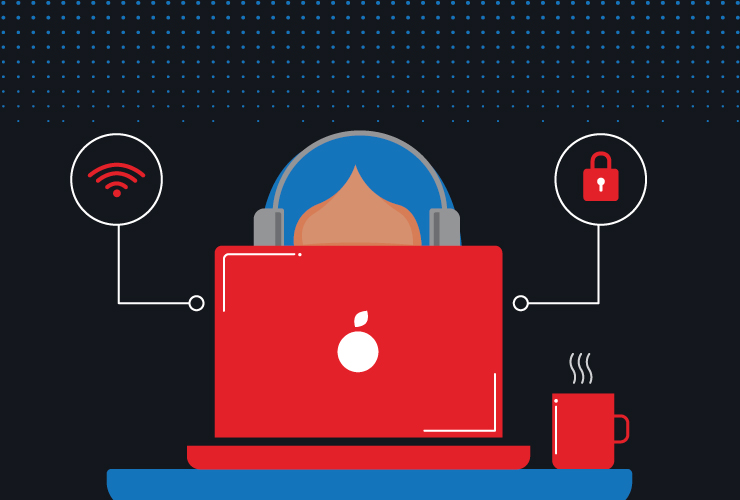September 23, 2021
Best Password Managers in 2022
If you’re still using passwords like “ABC123” to secure your online accounts, you really need [...]

Disclaimer: Partnerships & affiliate links help us create better content. Learn how.
Are you still working remotely, even after the pandemic? Trust us when we say you’re not alone. Working from home (at the very least on a hybrid model) seems to be becoming the norm across many industries. That’s why it’s so important to stay secure while working remotely.
Unfortunately, with cybersecurity issues becoming more prevalent, we want to make sure that you have all the tools to work from home safely. Your employer may provide you with a work computer, but that alone will not protect you from potential breaches. Keep reading along to learn more about how you can protect yourself online.

Here are a handful of steps you can take to make sure your online privacy is never compromised while working remotely.
Make sure you are clicking on reputable sources in your search engine of choice when researching for work. As people looked up information on COVID-19 during the pandemic, for example, cybercriminals took advantage of this phenomenon by creating malware campaigns fronting as government organizations like the CDC. Be sure not to click any pop-up links, and always go directly to the official website you’re seeking information. You are also going to want to update your browser frequently to ensure its security is air-tight.
Creating unique passwords for each of your work accounts is crucial for staying secure while working remotely. Be sure your passwords are not only challenging to guess but have both upper and lower case letters and unique characters. For an extra layer of security, you can also download a password manager with one master password, so you don’t have to memorize the credentials for all your accounts.
VPNs secure your network and encrypt your data. Using a VPN is especially important if you connect to a public network. It’s also important to note that all the devices in your home communicate with each other, especially if they’re all connected to the same network. Using a VPN will ensure your web traffic isn’t breached by any potential threats. If you’re unsure where to start, we have a great list of the best VPNs for security and privacy. One provider, in particular, that’s tried and true is IPVanish. You can check out its plans below.
Sharing your screen during work meetings is inevitable at times, but that doesn’t mean you shouldn’t be careful. In other words, make sure you don’t have any unnecessary windows or tabs open when you know you’re going to be sharing your screen. You may end up sharing sensitive information or something you simply don’t want your coworkers to see.
It’s not uncommon to get sketchy emails sent to your work email address. These are known as phishing emails. Phishing emails are created to steal personal information and login details from work accounts. Do your best not to open these emails, and definitely do not click on any links or attachments. If possible, report any suspicious emails immediately and delete them from your account.
There are a variety of easy steps you can take to stay secure in your work-from-home setting. With all the tips we just listed in mind, it’s essential to realize that using a VPN service will thread the needle between all of these steps and give you the extra layer of security you need. If your work allows you to, a VPN will also ensure you remain safe on public wireless networks. Let’s be realistic here; it’s nice to get out of your usual surroundings every once in a while.
Most importantly, don’t forget to log off at the end of your workday!

| Cookie | Duration | Description |
|---|---|---|
| __cfduid | 1 month | The cookie is used by cdn services like CloudFlare to identify individual clients behind a shared IP address and apply security settings on a per-client basis. It does not correspond to any user ID in the web application and does not store any personally identifiable information. |
| cookielawinfo-checkbox-advertisement | 1 year | The cookie is set by GDPR cookie consent to record the user consent for the cookies in the category "Advertisement". |
| cookielawinfo-checkbox-analytics | 1 year | This cookies is set by GDPR Cookie Consent WordPress Plugin. The cookie is used to remember the user consent for the cookies under the category "Analytics". |
| cookielawinfo-checkbox-necessary | 1 year | This cookie is set by GDPR Cookie Consent plugin. The cookies is used to store the user consent for the cookies in the category "Necessary". |
| cookielawinfo-checkbox-non-necessary | 1 year | This cookie is set by GDPR Cookie Consent plugin. The cookies is used to store the user consent for the cookies in the category "Non-necessary". |
| cookielawinfo-checkbox-performance | 1 year | This cookie is set by GDPR Cookie Consent plugin. The cookie is used to store the user consent for the cookies in the category "Performance". |
| viewed_cookie_policy | 1 year | The cookie is set by the GDPR Cookie Consent plugin and is used to store whether or not user has consented to the use of cookies. It does not store any personal data. |
| Cookie | Duration | Description |
|---|---|---|
| cookielawinfo-checkbox-functional | 1 year | The cookie is set by GDPR cookie consent to record the user consent for the cookies in the category "Functional". |
| cookielawinfo-checkbox-others | 1 year | No description |